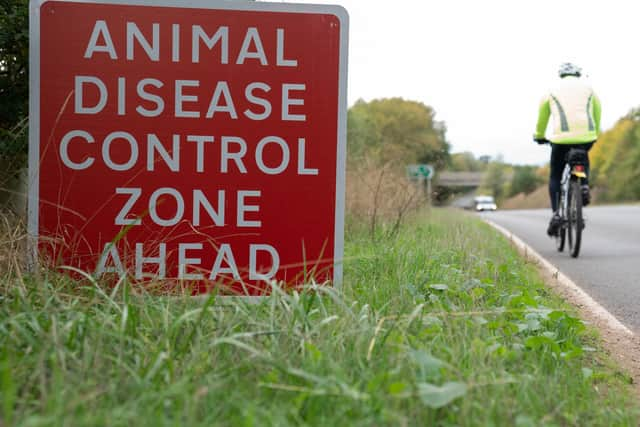Controls on birdkeepers come into force as concerns over avian flu mount
The order extends the mandatory housing measures already active in Suffolk, Norfolk and parts of Essex to the whole of England following an increase in the national risk of avian influenza in wild birds to very high.
The UK is facing its largest outbreak of bird flu, with 227 cases confirmed on commercial premises, smallholdings and in pet birds since October last year. There have been 93 cases since October 1 2022. On Saturday the highly pathogenic strain of the H5N1 virus was confirmed in a commercial flock at an eleventh premises near Dereham, Breckland, Norfolk.
Advertisement
Hide AdAdvertisement
Hide AdBird flu normally peaks over the winter months as the virus comes in from Eurasia with migrating birds before petering out and gradually disappearing during the spring.


However this year the strain had a devastating impact on seabird populations throughout the summer.
RSPB Bempton Cliffs - where half a million seabirds gather every year to raise a chick - had its worst breeding season ever for gannets, its largest inhabitants, which return to the same nest site from West Africa every year. Hundreds of adults and chicks are believed to have died.
The next few weeks will be critical as migratory waterfowl gather at their wintering sites, increasing the risk of infection.
Advertisement
Hide AdAdvertisement
Hide AdThe housing measures legally require all bird keepers to keep their birds indoors and to follow stringent biosecurity measures to help protect their flocks from the disease, regardless of type or size.
These include cleansing and disinfecting footwear and clothing before and after contact with birds, reducing the movement of people on to premises and storing bedding properly so it does not get contaminated by wild birds. The British Poultry Council said last week that the free range turkey sector, producing over one million Christmas turkeys, has taken the biggest hit with around 30 per cent to 35 per cent directly affected by bird flu.
Christine Middlemiss, chief veterinary officer, said: “Many poultry keepers in England have excellent biosecurity standards but we know that one small mistake is all it takes to introduce bird flu on to premises and kill flocks.
“A housing order alone will not be enough to reduce infection rates. Implementing scrupulous biosecurity and separating flocks from wild birds remains the best form of defence. Whether you keep just a few birds or thousands, from today onwards they must be housed under cover to protect them from this highly infectious disease.”
Advertisement
Hide AdAdvertisement
Hide AdThe World Organisation for Animal Health has reported outbreaks of the H5N1 virus in domestic poultry in Belgium, France, Germany, Italy, Norway and the Netherlands. Cases in non-poultry, including wild birds, have been reported in a dozen countries including the Faroe Islands, Iceland, Russia and Spain.
The UK Health Security Agency advises that the risk to public health from the virus is very low.
The Food Standards Agency advice that avian influenzas pose a very low food safety risk for UK consumers also remains unchanged.
